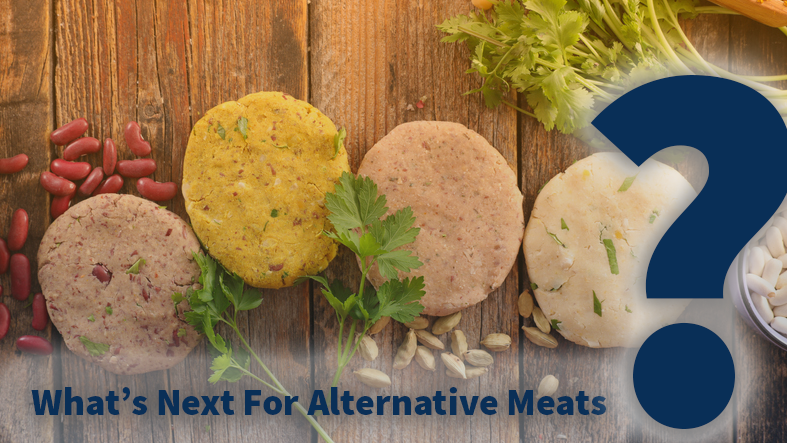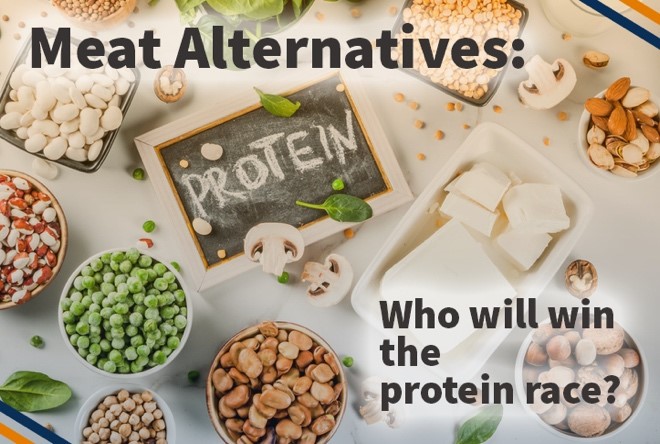Meat alternatives continue to make the news—from litigation over meat naming rights to the latest plant-based startup to get funding.
We first reported on protein alternatives in February 2017. In the article, we looked at global protein demand and dwindling supplies, expected population growth, and the edgy startups creating plant-based, fish-based, and lab-grown “meat.”
Two-and-a-half years later, there’s hardly a food industry newsfeed that doesn’t mention protein alternatives. In this post, we dig into the future of alternative meat and what the growing market might mean to the food industry.
The meat alternatives article that got our attention
Recently, A.T. Kerney published an extensive report on cultured meats and meat alternatives. The report explores the potential for this developing industry to disrupt the agriculture and food industry.
Here are some key takeaways:
1. The global population is expected to reach 10 billion by 2050, requiring “a massive amount of food” to feed everyone.
2. Almost half of the global harvests feed livestock.
3. Alternative meats can be divided into two main groups: novel vegan meat replacement and cultured meat.
4. Novel vegan meat replacements are available to consumers (e.g., meatless burgers and sausages); cultured meat is not.
5. Cultured meat has the potential to corner the market.
What’s next for alternative meats?

According to A.T Kearney, both novel vegan meat replacements and cultured meat will see significant growth in the upcoming decades.
However, while meats replacements have experienced substantial growth (including increased consumer acceptance and Big Food and VC backing), it’s predicted that their progress will plateau (around 2035). This leveling-off will be due to limited innovation opportunities.
On the competitive front

For right now, the competition on the meat-alternative front is fierce. Beyond Meat led the alternative-meat field for the first couple of years, benefiting from Tyson’s Food backing and a successful IPO. More recently, other companies have proven worthy competitors, including Impossible Foods (maker of Burger King’s Impossible Whopper burger), Nestlé, and ConAgra.
Also, joining the field is Kellog Company. It’s plant-based division MorningStar already has established products, such as veggie-based hotdogs and chicken nuggets. With some tweaking and innovation, they’re in a position to produce and market “better-tasting” plant-based options.
Who will stay the course?

According to the Kearney report, cultured meat, which is not yet available for consumption, has the potential to catapult ahead of the novel vegan meat replacement market.
Once the technology is approved (which is already underway in the form of FDA and USDA regulations), and lab meat goes into production, the cultured meat industry will branch out far beyond just meat production. In addition to creating meat from cells, companies could corner animal by-products markets by cultivating products such as “cultured milk, egg whites, gelatin, and leather.”
What do meat alternatives mean for the food industry?
Within the next 20 years, as populations grow, and the overall demand for food increases, efficient food production will be a priority. That may include redirecting a higher percentage of harvest foods back into the food supply (versus feeding it to livestock).
Moreover, as meat alternatives gather momentum, traditional meat production may shift from a feed-the-masses model to a more exclusive, curated market for meat connoisseurs.
Also, if research and development, government regulation, and consumer acceptance align with cultured-meat production, the lab-made protein could be the food that sustains future global populations.
What are your thoughts on the future of traditional meat versus meat alternatives and cultured meat? Please let us know in the comments.
At Ingredient Exchange, we help food industry businesses find alternative markets for their off-spec and down-graded inventory. Let us know when we can be of service. For more information, call us at 314-872-8850.
